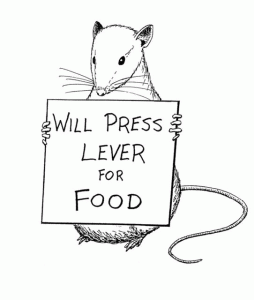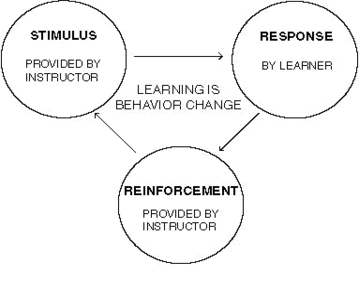Archetypes Through a Psych Lens: Behaviorism
Tantz_Aerine at March 27, 2021, midnight

The father of behaviorism is B. F. Skinner. Yet another founding father of Psychology that one cannot bypass when talking about theories of personality. 
The man himself, known for having said "give me a child, and I'll shape him into anything"
Skinner's theory was radical and groundbreaking in that it is a theory of personality as an aggregate of a person's learning experiences.
That means that behaviorism does not recognize free will. It does not recognize traits or characteristics. Behaviorism only recognizes "reinforced behaviors" (more about that in a bit). Skinner has a quote that illustrates his approach to the human experience, and how people are shaped to be who they are, very succintly:
"I did not direct my life. I didn't design it. I never made decisions. Things always came up and made them for me. That's what life is."
Before we can go any further, I must explain what learning means in behaviorist terms. For behaviorism, learning is the change of behavior.
For example, when you touch the hot stove, get burned, and then never touch the stove again before checking if it's hot, learning has taken place.
If behavior doesn't change in any overt manner, then learning hasn't taken place. For example, if you eat bad oysters, have a horrible food poisoning episode, and then as soon as you are okay again and get access to oysters, you eat them again, learning has not taken place.
How do we learn, then? Why do we learn some things, while we don't others?
Skinner posited that we learn because we are driven to survive. Anything that helps us survive in some manner, becomes reinforcing to us and the behavior that produced the reinforcement is likely to happen again. When this link between reinforcement and reinforced behavior is solidified, learning has taken place, and this learning experience is added to all our others. These learning experiences then shape our personality.
An important thing to note is that "what helps us survive" and "what is reinforcement" CAN BE ANYTHING. That includes what we would estimate/value as positive AND negative. Here is an example:
A mom giving her kid a sweet for being good at the doctor's is positive reinforcement for calm behavior at the doctor's. Enough of these types of learning experiences and the child is likely to develop a calm, behaved demeanour.
A mom giving her kid a sweet to shut him up because he's throwing a tantrum in the supermarked is ALSO positive reinforcement for throwing tantrums at the supermarket. Enough of these types of learning experiences and the child is likely to develop a loud, obnoxious, and demanding attitude whenever he/she wants something.
Also- a mom that neglects her child, and only punishes him/her when he/she acts out is ALSO positive reinforcement for acting out, because she gives her kid attention that he/she craves, even if that attention is negative since it's punishment, thus reinforcing the kid's acting out behavior.
The above examples are positive reinforcement: engaging in/enhancing behavior to gain access to a stimulus that is rewarding in some way. The ones I'm about to give now are examples of negative reinforcement: engaging in/ enhancing behavior to AVOID or REMOVE a noxious stimulus. So-
When a mom gives her kid a sweet to stop him/her from throwing a temper tantrum in the supermarket, the mom receives negative reinforcement: by giving her kid the sweet, she REMOVES the noxious stimulus of his/her temper tantrum and receives peace and quiet instead.
When you put on a hat because it's very sunny outside, you are doing it because you seek to REMOVE the potential of the noxious stimulus of getting sunstroke and thus you are negatively reinforced to keep on doing it.
In the end, Skinner and behaviorists in general are saying that this is the mechanism that controls us: 
The 'learner' is us, and the 'instructor' is anything that can make us change our behavior: our parents, our teachers, the weather, a virus, a plague, abundance of food or famine, war or peace, our pet, the table we stump our toe against and then kick in anger, and so on.
Bottom line, according to Behaviorism and behaviorists in general, we as individuals are a product of our environment 100%. Nothing else shapes us and we can't go against our own learning experiences.
Now, there are a lot of learning mechanisms, from classical conditioning (Pavlov's dog) to operant conditioning (lever pressing rats) to a lot more variations that I invite you to explore if you like. But for the purposes of writing, these are the principles you need to keep in mind.
When building a character through the lens of Behaviorism, you need to account for EVERY TRAIT (which isn't a 'trait' but a result of a bunch of learning experiences) as having been yielded by stimuli that yielded some kind of reinforcement in the past which netted the behavior you want.
Is your character generous? - where/how did they learn that? Was it learning by imitation? What reinforced that behavior rather than a tightwad's behavior?
Is your character an introvert? - where/how did they learn that? In what way were they reinforced to be introvert rather than an extrovert?
Is your character prone to shoplifting? -where/how did they learn that? How were they reinforced to keep doing it despite potentially noxious stimuli like getting arrested? (or is getting arrested reinforcing in some way for them?)
Skinner's school of thought is one I have a lot of respect for, even though I dislike it too: first off, because it's quantifiable. Second off, because it does bring forth results when used properly. Why do I dislike it? Because it fails to account for certain things and seeks to explain all behavior in a very sweeping manner inspite of the things it cannot account for- such as motivation. But a very big element of how we are shaped IS through behavioral principles and that cannot be ignored. It only needs to be added to, and that is what Cognitive Theories did.
PS: it is the end of this article and I realised I skipped Freud's second part about the oral/anal/phallic stages of psychosexual development. I apologize for that. I'll come back to it when I'm done with all the theories. Promise.
Don’t forget you can now advertise on DrunkDuck for just $2 in whichever ad spot you like! The money goes straight into running the site. Want to know more? Click this link here! Or, if you want to help us keep the lights on you can sponsor us on Patreon. Every bit helps us!
Special thanks to our patrons!!



Justnopoint - Banes - RMccool - Abt_Nihil - PhoenixIgnis - Gunwallace - Cdmalcolm1 - PaulEberhardt - dragonaur - Emma_Clare - FunctionCreep - Eustacheus - SinJinsoku - Smkinoshita - jerrie - Chickfighter - Andreas_Helixfinger - Tantz_Aerine - Epic Saveroom - Genejoke - Davey Do - Spark of Interest - Gullas - Damehelsing - Roma - NanoCritters - Scott D - Bluecuts34 - j1ceasar - Tinchel - PhillipDP - Teh Andeh - Peipei - Digital_Genesis - Hushicho - Sad Demon Comics - JediAnn Solo - Kiddermat - BitterBadger - Palouka - cheeko - Paneltastic - [https://www.theduckwebcomics.com/user/L.C.Stein/]L.C.Stein - Zombienomicon


Comments
Please login to comment.
Login or Register${ comment.author }} at
${ comment.author }} at